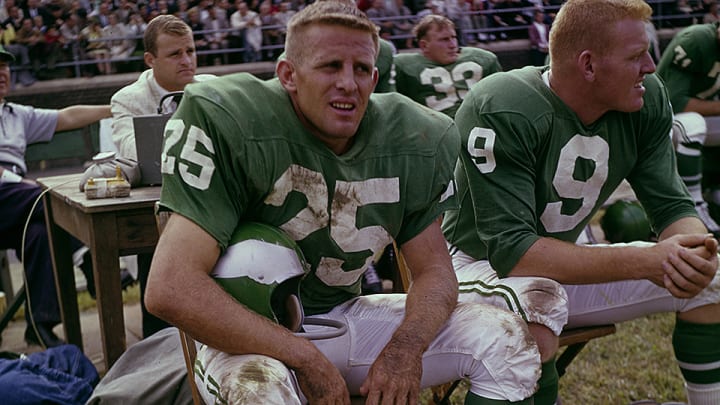Journalist turns friendship with Hall of Famer Tommy McDonald into play

Your teams. Your favorite writers. Wherever you want them. Personalize SI with our new App. Install on iOS or Android.
On the January day in 1998 when Eagles great Tommy McDonald found out that he had been elected to the Pro Football Hall of Fame, his first call was to Ray Didinger, a much-respected Philadelphia media personality.
“August 1, Canton, Ohio, you and me, baby!” McDonald shouted into the receiver. That was his way of asking Didinger to introduce him at the Hall, an invitation that has gone to precious few journalists over the years.
But few journalists had the kind of long and meaningful relationship with an athlete that Didinger shared with McDonald, who over 12 seasons caught pretty much everything thrown his way at his wide receiver position, then more commonly called flanker.
That relationship is the subject of Didinger’s play, Tommy and Me, which begins a 12-performance run on August 3 at the Fringe Arts theater in Philadelphia.
“I’m both excited,” says Didinger, “and terrified.”
Player and writer first met back in the late-1950s when the Didinger family made its annual summer pilgrimage to Hershey, Pa., where McDonald’s Eagles trained. Well, “met” is pushing it. Didinger was one of the eager kids who followed McDonald to practice, sometimes carrying his helmet and all the while jabbering about the receiver’s stats at Oklahoma. What attracted Didinger to McDonald was the same thing that attracted thousands of others (including the author of this piece): McDonald was an undersized (5' 9", 170 pounds), glue-fingered technician with an oversized, folksy personality.
• SI’s best players by position | Outside WRs | Slot WRs | Tight ends
Years later, after Didinger, 69, had become one of the most respected pro football writers in the country—along with a TV personality and one of the few sports radio talkers you can listen to without your ears bleeding—he would interview McDonald from time to time, reticent to tell him about their past connection. “What came across when I talked to Tommy was how much it would mean to him to make the Hall of Fame,” says Didinger.
Didinger thought that McDonald belonged. (He had 495 career receptions, 8,410 yards, and 84 touchdowns, including one in the Eagles’ victorious 1960 championship game against Vince Lombardi’s Packers.) As a Hall of Fame voter in 1995, Didinger led the charge for McDonald, somewhat confident that he would make it. But …
“Tommy didn’t even make the top 10,” says Didinger. “I took it really hard. I took it personal. I really felt I had let Tommy down.”
But Didinger kept up his lobbying, aided by two other influential journalists, SI’s Peter King and Paul Zimmerman. And in 1998, McDonald got the call to Canton. And Didinger got the call to come with him.
Their moment in Canton punctuated a kind of dramatic arc as Didinger saw it—kid worships player, interviews player as a professional, advocates for player as a friend and introduces him for the Hall of Fame. Didinger carried it around with him. He didn’t think he could do the story justice in a newspaper or magazine story and thought it not quite a long enough tale for a book.
Ah, but how about a play?
“Only problem,” said Didinger, “was that I had never written one.”
• What if the Jets have to start Geno Smith...and he's not terrible?
He has now. With the help of Joe Canuso and Bruce Graham, Philadelphia-based director and playwright respectively, his original two-character narrative—“it was more of a long lecture when I first wrote it,” says Didinger, who has now been through a half dozen drafts—has been shaped into a 75-minute drama with four characters. The added characters—the 10-year-old Didinger and the younger McDonald, who first meets the hero-worshipping, stats-spouting kid—were suggested by Graham.
“The adult me is the reporter, the emotionless observer,” says Didinger, “and the kid becomes my conscience, the voice on my shoulder. He remains stuck in time with a 10-year-old kid’s view of sports. He’s the one who asks: ‘Where’s the emotion? Where’s the heart? Why can’t you be a fan and a journalist?’”
The 81-year-old McDonald hasn’t read the script. He’s had a few health problems but is expected to attend a couple of the performances. And it’s highly probable he will give Tommy and Me a thumbs-up.
“Tommy showed up unexpectedly at the first table reading we had a year ago,” said Didinger, “and at one point he sprung to his feet and led the audience in an Eagles cheer. That’s just Tommy.”
